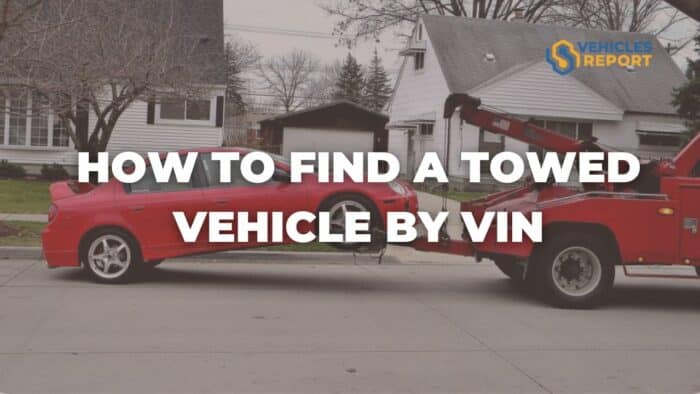Have you ever parked your car in a hurry and returned later to find it missing? It’s a disheartening feeling, but before you jump to conclusions and assume your car has been stolen, it’s important to consider the possibility that it may have been towed. In such situations, finding your towed vehicle quickly becomes a top priority. Thankfully, with the help of your vehicle identification number (VIN) and a few simple steps, you can track down your impounded car efficiently. In this comprehensive guide, we’ll walk you through the process of finding a towed vehicle by VIN. So, let’s get started!
Reasons why a car can get towed
There are several reasons why a vehicle can get towed, and if you know these reasons, you don’t have to worry about your vehicle being towed. Although you can easily find towed vehicles by VIN, you need to know these reasons to avoid them. Some of these reasons are:
Illegally Parked or Blocking Traffic
One of the most common reasons for towing is parking violations. If you park your vehicle in a no-parking zone, in front of a fire hydrant, or in a spot reserved for emergency vehicles, it can be towed. Similarly, blocking traffic, driveways, or entrances can also result in towing as it poses a safety hazard or obstructs the flow of vehicles.
Expired or Invalid Registration
Driving with an expired or invalid registration is illegal and can lead to your vehicle being towed. It’s essential to ensure that your registration is up-to-date and displayed properly on your license plate or windshield sticker, as required by local regulations.
Abandoned or Inoperable Vehicle
Leaving an abandoned or inoperable vehicle on public or private property can result in towing. Authorities and property owners have the right to remove vehicles that are not in use or have been left unattended for an extended period. If your car is in need of repairs or cannot be driven, make sure to store it in a designated area or seek permission from the property owner.
Traffic Violations
Serious traffic violations, such as reckless driving, driving under the influence (DUI), or driving with a suspended license, can lead to the immediate towing of your vehicle. These violations endanger public safety, and authorities take swift action to remove the vehicle from the road.
Unpaid Tickets or Fines
Accumulating a significant number of unpaid parking tickets or traffic fines can result in your vehicle being towed. Municipalities have systems in place to identify repeat offenders and take measures to enforce payment. To avoid towing, it’s crucial to promptly pay any outstanding fines or resolve any ticket issues.
Vehicle Recovery
In some cases, law enforcement agencies may tow vehicles that are involved in criminal activities, stolen, or suspected to be involved in a crime. This ensures the safety of the public and facilitates investigations.
Private Property Towing
Private property owners, such as businesses or residential complexes, may tow vehicles parked without authorization. It’s important to respect parking rules and signage on private property to avoid having your car towed without warning.
Roadway Maintenance or Construction
During road maintenance, construction, or events, local authorities may tow vehicles to clear the area and ensure the safety of workers and pedestrians. It’s essential to pay attention to temporary signage and parking restrictions during such situations.
Remember, the specific reasons and regulations for towing can vary by jurisdiction, so it’s important to familiarize yourself with local laws and parking regulations. By following parking rules, maintaining valid registration, and being mindful of traffic laws, you can reduce the chances of your vehicle being towed and save yourself the hassle and expense of retrieval.
Tips to prevent my car from being towed
Now that you know the reasons why your vehicle may be towed, leaving you to find a towed vehicle by VIN, you need to be cautious enough to avoid getting into that sticky situation. It may take up to 2 or 3 days to get your vehicle back and may have a really rigorous procedure that may not fit into your schedule, so it’s recommended that you keep an eye out for signs of areas where you shouldn’t park and be sure your vehicle papers are in order. Some tips that can help you avoid finding a towed vehicle by VIN include:
- Respect parking regulations and park in designated areas.
- Avoid parking in no-parking zones or blocking fire hydrants, crosswalks, and driveways.
- Adhere to time restrictions and move your vehicle when necessary.
- Ensure your vehicle’s registration is valid and clearly displayed.
- Regularly maintain your vehicle to prevent breakdowns and malfunctions.
- Obtain permission to park on private property and follow their rules.
- Stay aware of temporary parking restrictions during road maintenance or events.
- Promptly address parking tickets and fines to avoid further consequences.
- Utilize authorized parking facilities for added security.
- Stay updated with local parking regulations to stay compliant.
Okay, so you can’t find your vehicle? It may not have been stolen. Your first step is to find the towed vehicle by VIN. But what’s a VIN? Let’s find out now!
What is a Vehicle Identification Number (VIN)?
The VIN is a 5- to 17-character code found on the dashboard or driver’s side door of a vehicle that identifies the vehicle and holds accurate information about a specific vehicle. Each vehicle during manufacture is assigned a VIN that can be used to check important vehicle information with the right tools. For example, with the VIN Check tool provided by Vehicles Report, a car owner or buyer can gain access to any vehicle’s specifications and history, including:
- Accident history
- Auction records with more than 10 photos
- Sales history
- Open recalls
- Damage records
- Lien and loan records
- Theft records
- Ownership history
- Title-brand records
- Warranty information
- OEM maintenance schedules
- Service history, and more
- Find towed vehicle by VIN
If you suspect the vehicle you are buying may be a stolen car, you can verify this with Vehicles Report, but if you feel your vehicle has been towed, you should pay good attention to the next section.
How to Find a Towed Vehicle by VIN
Contact the Local Authorities
When you realize your vehicle is missing, the first step is to contact the local authorities. Reach out to the non-emergency police line or the traffic division and provide them with your VIN. Inform them that your car might have been towed and request any relevant information about impounded vehicles matching your VIN. The authorities will guide you through the next steps and provide you with the necessary information to retrieve your car.
Utilize Online Search Tools
In today’s digital age, many cities and municipalities have online platforms that allow you to find impounded cars by VIN. These search tools streamline the process and provide you with instant access to impound records. Simply visit the official website of your local towing or impound lot and navigate to their “Search” or “Find Impounded Vehicle” sections. Enter your VIN in the search bar and let the system work its magic. If your vehicle is in their custody, the search tool will display the relevant information, including the impound location and any associated fees. This is one of the easiest ways to find a towed vehicle by VIN.
Seek Assistance from Towing Companies
In some cases, local towing companies may have towed your vehicle on behalf of the authorities. To find out if this is the case, contact towing companies in your area. Provide them with your VIN and inquire about any vehicles they have towed recently. They will be able to inform you if your car is in their possession and guide you through the necessary steps to reclaim it.
Check with Municipal Impound Lots
Apart from private towing companies, municipal impound lots may also house towed vehicles. These lots are often managed by the city or county government. Call the impound lots in your area, provide them with your VIN, and ask if they have any records of your vehicle being towed and impounded. They will be able to help find an impounded car by VIN.
Expand Your Search to Surrounding Areas
If you haven’t had any luck finding your towed vehicle by VIN within your immediate area, it’s worth broadening your search to nearby cities or counties. Towed vehicles are sometimes transported to impound lots located outside the immediate vicinity. Contact the authorities, towing companies, and impound lots in those areas and provide them with your VIN to check if your car has been relocated.
Take the necessary documentation and Retrieve Your vehicle
Now, you’ve gotten to the last step to find a towed vehicle by VIN. Once you’ve located your towed vehicle, gather all the necessary documentation before proceeding to the impound lot. These documents usually include proof of ownership (vehicle registration), a valid driver’s license, and any relevant paperwork provided by the authorities or towing company. Additionally, be prepared to pay any outstanding fines or fees associated with the towing and impound process. Once you arrive at the impound lot, present the required documents and pay the fees, if applicable, to carry out an impound VIN search and retrieve your vehicle.
Now you know how to find a towed vehicle by VIN. Finding a towed vehicle by VIN might seem like a daunting task, but by following the steps outlined in this guide, you can streamline the process and increase your chances of quickly locating and reclaiming your impounded car. Remember to utilize the VIN check tool provided by Vehicles Report if you are in the market for a used car. Stay vigilant, keep your VIN handy, and always park responsibly to minimize the chances of your vehicle being towed in the first place.








